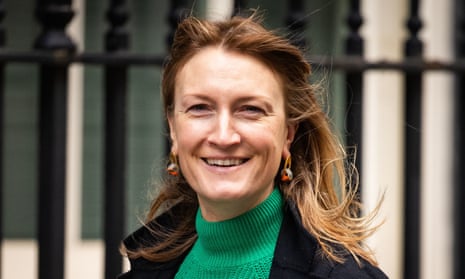When the decision was finally taken to scrap the much-delayed televised press briefings that No 10 had hoped would provide greater control of the media agenda, there was a quiet sigh of relief among some in Downing Street.
With £2.6m spent on a new studio, weeks of rehearsals and start dates repeatedly pencilled in then rubbed out, insiders had been grappling with whether to press ahead with the plan devised last summer by the then head of communications, Lee Cain.
As websites and airwaves were buzzing on Tuesday night with breaking developments on the collapse of the European Super League and the veterans minister being dismissed, the news was slipped out that the briefings had finally been canned and Allegra Stratton, the press secretary hired to present them, had been handed a new role as spokeswoman for this autumn’s Cop26 climate change conference in Glasgow.
“We all knew it was just going nowhere,” a No 10 source said. “It’s been kicked down the road for so long, it was inevitable.” They explained government spinners had been working in “overdrive” for the past 12 months and that while the plan was initially conceived as a way to increase transparency during the coronavirus pandemic, appetite had subsided and given way to fatigue, adding: “We’re just glad it’s finally over.”
Other insiders pointed out that the row over the briefings and the fallout about control in No 10 had now cost Boris Johnson four of his most senior advisers – Cain, his successor James Slack, top aide Dominic Cummings and now Stratton – and that rehearsals that took place in January and February were not viewed to have gone well.
Slack is said to have been deeply uneasy about the whole concept of the briefings, which he inherited when Cain quit last November, and their potential pitfalls of constant awkward questions levelled at the government spokesperson playing out on camera and being aired on the news.
As ministers have seen when tasked with defending tricky issues such as Cummings’ lockdown trips and Johnson’s relationship with US businesswoman Jennifer Arcuri, the briefings would have provided a more regular, public forum where, as one Conservative HQ staffer said: “There’s more opportunity for the government to be tripped up.”
Others say the issue was that Stratton was not the right candidate and the success of the White House briefings also depended on the person chosen to lead them – pointing to the success of Joe Biden’s press secretary, Jen Psaki.
“This entire concept was Boris’s idea, he was excited by it, he was the one who signed off the spending, he wasn’t bounced into it at all,” one source said. “He’s the one who has decided to can it now when it became clear it was not going to work.”
Tory sources said they had been struck by the decision not to promote Stratton to head of communications and instead opt for Jack Doyle, who was Slack’s deputy. “It looks strange for her to suddenly depart for a job that never existed before,” said one.
Stratton was said to have been championed by Johnson’s fiancee, Carrie Symonds, although sources played down how close a relationship the pair actually had – suggesting that Symonds simply preferred Stratton’s style to Cain’s. However, one source claimed that Stratton was seen to have misstepped when she answered a question that was considered by Symonds to have been personal.
A minister also voiced concern the briefings would have been a sideshow and was glad that Downing Street had continued, since Cain’s departure, to “bring the temperature down” and reduce hostility towards the media, adding it would be good for the government to “not be making an announcement every day for the sake of making an announcement”.
They admitted it was difficult to justify the spending splurge and this now presented an awkward problem for the government – but insisted a proper press conference space in Downing Street had been “badly needed”.
One Tory MP said the briefings, had they gone ahead, would have been like “a lads’ holiday to Ibiza”, where the journalists would be “trying to get one up on each other and do the most outrageous thing” while the government spokesperson would try to become a celebrity in their own right.
Stratton might have relished the chance to perform the broadcast part of her government role, rather than being left stuck on the end of a phone line for the daily lobby briefings that will continue in their current format.
But with that prospect now axed, Johnson still wanted her to continue working closely with him and on a beat of significant personal interest. While not an expert on climate change, in 2009 when she worked for the Guardian Stratton covered the then climate change secretary Ed Miliband’s attempts at negotiating a new agreement at Cop15 in Copenhagen.
Replacing her as press secretary is Rosie Bate-Williams, a former media special adviser in Downing Street and before that press officer in Conservative HQ. She also worked on Johnson’s leadership campaign, and was described by colleagues as “reliable, clear, firm and calm”.
